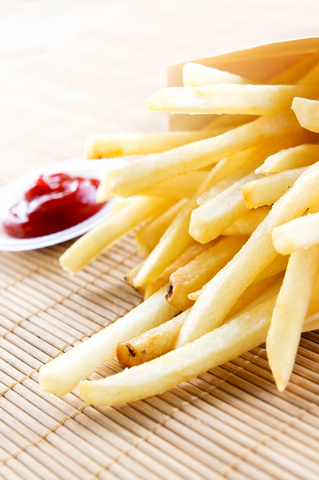Your body needs fat to function, but there’s a big difference between the natural fats in, say, a grass-fed organic burger and those in a chocolate doughnut. The type of fat you eat can literally make or break your health, which is why it’s absolutely crucial that you can decipher good fats from bad.
As a general rule of thumb, remember this … synthetic artificially created fats — or those that are damaged by heat or oxidation — are going to be among the worst for your health. These are the fats you should avoid at all costs, lest you risk seriously damaging your health.
1. Synthetic Trans Fats (Partially Hydrogenated Vegetable Oil)
 Synthetic trans fats have been linked to heart disease, heart attacks, diabetes, cancer, increased inflammation and more. Food manufacturers use hydrogenation because it increases the shelf life and flavor stability of foods, and makes fats and oil solid, even at room temperature.
Synthetic trans fats have been linked to heart disease, heart attacks, diabetes, cancer, increased inflammation and more. Food manufacturers use hydrogenation because it increases the shelf life and flavor stability of foods, and makes fats and oil solid, even at room temperature.
Health agencies state that there is no safe level of trans fats to consume, but be aware that even if a label lists 0 grams of trans fats, it can legally contain up to half a gram per serving.
So don’t depend on claims of “trans fat free” or “zero grams of trans fat” on labels — look for partially hydrogenated vegetable oil instead. One point … trans fats also exist naturally in some foods, like meat and dairy products, but they don’t appear to have the same toxic effects as synthetic trans fats.
While checking the food label for partially hydrogenated oils is the best indicator of trans fats, some common culprits include fried foods (French fries, doughnuts), baked goods, pie crusts, pastries, pizza dough, cookies, crackers, stick margarine, shortening, pre-made frosting, biscuits and more.
2. Excess Omega-6 Fats (Especially if They’re Damaged, i.e. Most Vegetable Oils)
 Omega-6 polyunsaturated fats are essential for regulating your metabolism, maintaining your reproductive system and supporting skin, hair and bone health.[i] However, most Americans eat too many omega-6 fats (and far too little omega-3), especially in the form of inflammation-causing vegetable oils.
Omega-6 polyunsaturated fats are essential for regulating your metabolism, maintaining your reproductive system and supporting skin, hair and bone health.[i] However, most Americans eat too many omega-6 fats (and far too little omega-3), especially in the form of inflammation-causing vegetable oils.
Heating vegetable oils actually leads to the formation of dangerous trans fats, and many of these oils are rancid before you even open the bottle because of light and heat exposure during storage and transportation. When omega-6 vegetable oils are eaten in excess, it can lead to body-wide imbalances linked to diseases like cancer and heart disease.
For instance research shows women with the lowest intake of omega-3 fats and highest intake of omega-6 fats have a greater risk of breast cancer,[ii] while those with a higher omega-6 to omega-3 ratio may have an increased risk for many chronic diseases, including heart disease, cancer, and inflammatory and autoimmune diseases.[iii] So for most people, limiting your intake of vegetable oil (corn, canola, soy) is a smart health move. Keep in mind, this refers not only to your choice of cooking oil but also to your intake of processed foods. This is an important point — most of your omega-6 fat intake probably comes from the rancid vegetable oil found in packaged, processed foods and fast foods, which is why limiting them is crucial if you value your health.
You’ll notice saturated fats are not on this list, and this was not an error. Though controversial, I believe saturated fats belong on the list of healthiest fats, when consumed in moderation … See the 3 BEST Fats for Your Health Here!
And DON’T MISS…
Having Trouble Burning YOUR Unwanted Body Fat? You Need to Boost Your Body’s “YOUTH HORMONES”

